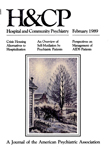Consultation-Liaison Psychiatry and HIV-Related Disorders
Abstract
Acquired immune deficiency syndrome (AIDS) and related disorders are increasingly and unsettlingly prevalent. The authors describe neuropsychiatric, psychosocial, and ethical-legal problems associated with HIV infection that are commonly encountered in a consultation-liaison psychiatry setting. Because of H1V's potential for undermining cognitive function, they recommend a systematic neurobehavioral assessment for the differential diagnosis of emotional disturbance, including a test battery that also identifies neurotoxic effects of pharmacological agents. Among significant psychosocial and ethical-legal problems are patients' reactions to AIDS, their fears of social abandonment, staff burnout, antibody testing, confidentiality, and the use of life-support measures. The consultation-liaison psychiatrist's awareness of the complexities of HIV-related neuropsychiatric symptoms and psychosocial issues can be of enormous benefit to medical caregivers and to the patients themselves.
Access content
To read the fulltext, please use one of the options below to sign in or purchase access.- Personal login
- Institutional Login
- Sign in via OpenAthens
- Register for access
-
Please login/register if you wish to pair your device and check access availability.
Not a subscriber?
PsychiatryOnline subscription options offer access to the DSM-5 library, books, journals, CME, and patient resources. This all-in-one virtual library provides psychiatrists and mental health professionals with key resources for diagnosis, treatment, research, and professional development.
Need more help? PsychiatryOnline Customer Service may be reached by emailing [email protected] or by calling 800-368-5777 (in the U.S.) or 703-907-7322 (outside the U.S.).



